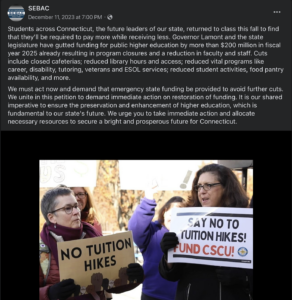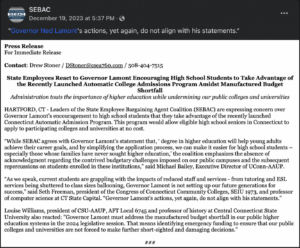Last month, the Connecticut Comptroller’s Office released its statutorily required annual report on savings generated by Gov. Dannel Malloy’s 2017 agreement with the State Employees Bargaining Agent Coalition (SEBAC) — which showed the actual savings to the state is $489 million year to date less than the estimated $5.9 billion that was promised.
In 2017, Gov. Malloy engaged in closed-doored negotiations, reaching an agreement with SEBAC — a coalition of unions representing more than 45,000 state workers — at a time when the state faced significant budget challenges. With the deal, the state was projected to save $24 billion over two decades primarily by freezing wages, adjustments to pension calculations and changing employee healthcare benefits.
In exchange, state employees reaped the benefits of a four-year protection against layoffs, received cash bonuses and guaranteed step and wage increases in the fourth and fifth years of the contract.
SEBAC members were also granted an extension on their health and retirement benefits, extending them through 2027. However, none of the raises SEBAC relinquished in negotiations were contractually obligated in the first place, making its “concessions” actually non-sacrificial to begin with.
According to the report, the estimated total savings for Fiscal Year 2023 were $965.3 versus the $1,132.1 billion projected in the Malloy/SEBAC deal with most of the contract’s savings provisions falling short of projections.
Remarkedly, for the fifth consecutive year, the anticipated savings from the wage freeze and pension recalculations have yet again fallen short of expectations, missing the mark by $181.5 million and $449.5 million respectively.
The one notable positive is in retiree health care which has saved $321.9 million during the same period. However, it is important to point out that all is not good with retiree health care overall.
As reported by CT Mirror in October, state workers collectively contributed $291 million in the 2021-22 fiscal year to allocate funds for the future retiree health care costs of current employees. However, if the intention was to not impose a financial burden on future generations, then the contributions pale in comparison to the $906 million actuaries have estimated. The $615 million deficit is expected to incur approximately $516 million in interest costs.
The Comptroller’s report also notes that calculating savings from the original agreement becomes more difficult as time passes.
“This is especially true for changes within complex systems like health care or pensions,” As we continue to move further out from the initial implementation date of SEBAC 2017, the accuracy of the savings attributed to such changes related to the agreement will grow less certain.”
Leveraging these so-called “cost savings,” SEBAC strategically used them as a negotiating tactic to successfully secure more bonuses and pay increases for its members. This tactic resulted in winning $35 million in pandemic pay in 2022. Eligible state workers received payment awards totaling $1,000 or more, with certain individuals receiving payouts reaching as high as $5,688.
This approach was also employed to secure approval from Gov. Ned Lamont and the General Assembly for an almost $2 billion deal in 2022, which included $3,500 in bonuses, raises and step increases for SEBAC members. However, the agreement did not include wage increases during the contract’s final year (July 2024-June 2025) — meaning they will have to re-negotiate with Gov. Lamont during the upcoming 2024 legislative session.
History suggests that SEBAC is poised to employ this strategy once more in the upcoming negotiation. But they may be overplaying their hand as they have not lived up to their end of the agreement regarding “concession” savings.
Will SEBAC Delete These Posts as Well?
SEBAC has once again taken to social media in December to criticize Gov. Lamont — coming remarkably close to calling him a liar. This time their beef with the governor revolves around an estimated $200 million budget shortfall in the state’s colleges and universities that will force tuition hikes, canceled programs and staff reductions. In response, they are demanding emergency state funding to balance the books and prevent additional cuts.
SEBAC has also leveraged a newly introduced initiative allowing graduating seniors in the top 30% of their class automatic admission to multiple participating colleges and universities through a single application to criticize the budget cuts. The coalition expressed approval for the program but conveyed dissatisfaction with the “absence of acknowledgment regarding the contrived budgetary challenges imposed on our public campuses and the subsequent repercussions on students enrolled in these institutions.”
The last time SEBAC used social media to condemn Gov. Lamont, it was reported by, yours truly, and the posts were instantly taken down. At the time, their issue was with how the governor was dealing with housing, energy prices, government spending and state agency staffing issues. They called his approach an “embarrassment” while criticizing him as an out of touch millionaire unsympathetic to rising heating fuel costs.
Looks Like UAW Will Hire Just About Anybody
The disgraced former executive director of the Service Employees International Union (SEIU) Connecticut may have found another job. Kooper Caraway resigned from the post due to a video posted on X (previously Twitter), where he praised individuals connected to the heinous attack on Israel just two days after the Oct. 7 assault.
In a tweet posted on Friday (Jan. 5), Caraway is shown wearing a tee shirt that says “Eat the Rich” with a United Auto Workers (UAW) union logo. His only comment is “announcement @UAW”. His partner, Puja Dattaon, then forwarded the tweet stating, “Proud of this guy.”
It is still unknown what his new position is and if he will still be located in Connecticut.
This Week on Yankee’s Podcast Y CT Matters
From electric vehicle mandates to housing, what policies will be up for debate in the upcoming legislative session, beginning Feb. 7? Eric Gjede, a chief lobbyist at Statehouse Associates, shares his insights for what’s in store in 2024.
Gjede was recently the Vice President of Public Policy at the Connecticut Business and Industry Association (CBIA). A lobbyist with CBIA for the past 11 years, Gjede has been at the forefront of nearly every major legislative issue affecting the state’s business community, including labor mandates, tax and fiscal policy, energy, healthcare, and unemployment compensation, among many others.
Click Here to Listen




